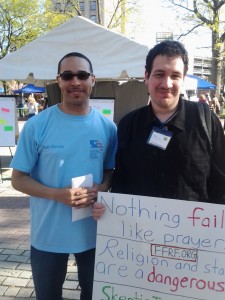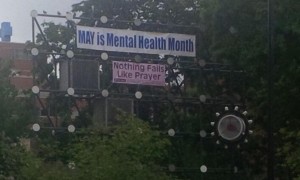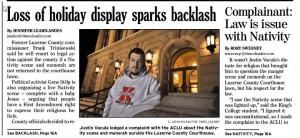
Would my activism for separation of religion and government be more effective if I were to remove atheism from the picture?
I have considered this question throughout my almost four-year-long efforts as an activist for the separation of government and religion…and as an atheist activist. I do not only challenge the constitutionality of particular laws and practices in government — often in my community of Northeastern Pennsylvania — but I also make a very public case in my community against religious belief.
In early 2013, with the help of the Freedom From Religion Foundation, I hung a banner reading “Nothing Fails Like Prayer” on Public Square in Wilkes-Barre in response to the government-sanctioned National Day of Prayer and a corresponding National Day of Prayer event — Circle the Square With Prayer — on Public Square in Wilkes-Barre. When protesting the event in addition to interacting with members of the local media and the general public, I made a case against this governmental flirting with religion and against the efficacy of intercessory prayer.
Perhaps more may have been receptive to my message if I instead hung a banner reading “Separate Church and State” and spoke exclusively about church/state concerns. Perhaps not. Perhaps leaving atheism out of the conversation would have also been a missed opportunity for conversation about the efficacy of prayer and the truth-value of religious belief.
I see my atheist activism and activism for church/state separation to be important. I wouldn’t want to sacrifice one domain in hopes that the other focus would be bolstered. I find faith/religious belief to be the root of many church/state concerns; if lawmakers were not religious individuals, lawmakers would not be as likely to infuse religion into government [they may still do so to pander, but this likelihood, I think, would be greatly reduced]. Because of this, and other concerns, I find it important to advocate for both church/state separation and atheism.

I also have reasons — unrelated to church/state separation and beyond the scope of this short piece — for advancing atheism. I find the conversation about religious belief and atheism to be extremely important mainly because I am concerned with justified true belief and the harm unjustified beliefs can cause. I see religious belief, particularly fundamentalist Christian views, to be particularly harmful in the United States. To tackle religious belief, which is the root of such harm and church/state violations, I advocate for both atheism and church/state separation.
Religious individuals who value church/state separation may still support my efforts for church/state separation or simply advance their own arguments in favor of church/state separation regardless of what I do. Perhaps my atheist activism may repel some religious supporters, but this doesn’t stop such individuals from working on their own.
—
In the past four years, I have heard both atheists and religious individuals tell me that — while they may agree with me on some issues — they don’t like ‘my message’ or my choice of issues to tackle. Not everyone will agree with me on everything, but these people are welcome to engage in activism on their own terms. The complainers in Northeastern Pennsylvania who are happy to fire away in comment sections of local media websites telling me I am ‘doing it wrong’ — as far as I know — have remained ‘keyboard commandos’ since 2009 although they, from the way they carry themselves telling me I am ‘doing it wrong,’ presumably have all the ‘right answers.’ Those who believe they have the answers and that I am ‘doing it wrong’ ought to act and show me how it is done…but they do not (and probably will never).

I do not think there is ‘one right way’ to approach activism which will draw in all demographics. Someone will complain. Some people will not care. Some will probably never change their entrenched positions (although some will and even moderate their views if not fully change perspective). No matter how mild my message may be, there will be people claiming offense and someone can claim that my activism isn’t working. Setting such a high bar will doom oneself to failure.
When someone is an activist for multiple causes — no matter how close or distant the overlap may be — one is bound to polarize people. While it is possible to be very effective when focusing on one issue, it’s also possible — although multiple issue focus may alienate people — to be highly effective when focusing on multiple issues and, by doing this, appeal to more demographics of people.
Religious individuals in favor of church/state separation are more than welcome to join me (or even work alone) as I continue to advocate for the separation of religion and government. While I am an atheist activist (and will continue to be), nothing is stopping religious people from joining me, whether working directly with me or acting alone, on a cause we — although we disagree on other issues — can all agree on.
As always, feel free to comment below.